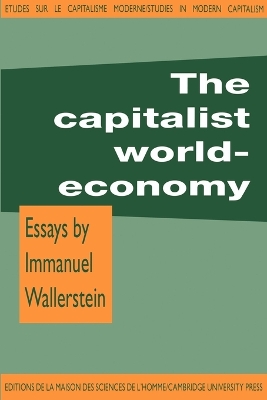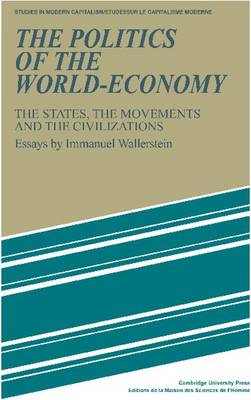Studies in Modern Capitalism
3 total works
In The Capitalist World-Economy Immanuel Wallerstein focuses on the two central conflicts of capitalism, bourgeois versus proletarian and core versus periphery, in an attempt to describe both the cyclical rhythms and the secular transformations of capitalism, conceived as a singular world-system. The essays include discussions of the relationship of class and ethnonational consciousness, clarification of the meaning of transition from feudalism to capitalism, the utility of the concept of the semi peripheral state, and the relationship of socialist states to the capitalist world-economy. This book is the first in a three volume collection of Wallerstein's essays. The Politics of World-Economy (1984) elaborates on the role of states, the antisystemic movements and the civilizational project. Geopolitics and Geoculture (1991) analyses both the events leading up to the collapse of the Iron Curtain, and the subsequent process of perestroika in the light of Wallerstein's own interpretations, and the ways in which the renewed concern with culture is a product of the changing world-system.
Creating and Transforming Households
by Joan Smith and Immanuel Wallerstein
Published 27 August 1992
This book, first published in 1992, seeks an explanation of the pattern of sharp discrepancy of wage levels across the world-economy for work of comparable productivity. It explores how far such differences can be explained by the different structures of households as 'income-pooling units', examining three key variables: location in the core or periphery of the world-economy; periods of expansion versus periods of contraction in the world-economy; and secular transformation over time. The authors argue that both the boundaries of households and their sources of income are molded by the changing patterns of the world-economy, but are also modes of defense against its pressures. Drawing empirical data from eight local regions in three different zones - the United States, Mexico and southern Africa - this book presents a systematic and original approach to the intimate link between the micro-structures of households and the structures of the capitalist world-economy at a global level.
In these essays, written (with one exception) between 1978 and 1982, Immanuel Wallerstein elaborates on the political and theoretical implications of the world-systems perspective outlined in his celebrated books The Modern World-System and The Capitalist World-Economy. Whereas those books centred on the historical development of the modern world-system, the essays in this volume explore the nature of world politics in the light of Wallerstein's analysis of the world-system and capitalist world-economy. Throughout, the essays offer new perspectives on the central issues of political debate today: the roles of the USA and the USSR in the world-system, the relations of the Third World states to the capitalist 'core', and the potential for socialist or revolutionary change. Different sections deal with the three major political institutions of the modern world-system: the states, the antisystemic movements, and the civilizations. The states are a classic rubric of political analysis. For Wallerstein, the limits of sovereignty are at least as important as the powers - these limits deriving from the obligatory location of the modern state in the interstate system. Social movements are a second classic rubric. For Wallerstein, the principal questions are the degree to which such movements are antisystemic, and the dilemmas state power poses for antisystemic movements. Civilizations, in contrast, are not normally seen as a political institution. That however is for Wallerstein the key to the analysis of their role in the contemporary world, and thereby a key to understanding the politics of social science.


